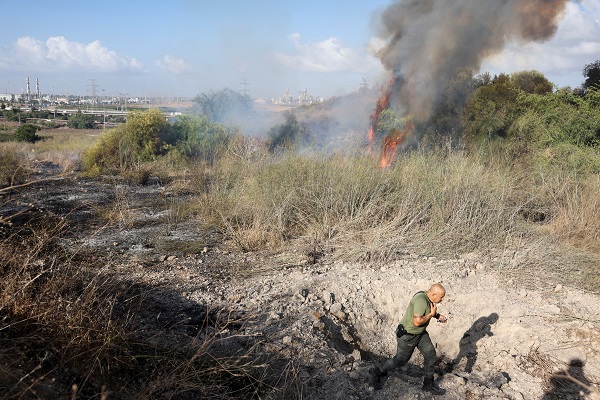 Smoke billows after a missile attack from Yemen in central Israel, 15 September 2024;
Credit: Reuters/Ronen Zvulun
Smoke billows after a missile attack from Yemen in central Israel, 15 September 2024;
Credit: Reuters/Ronen Zvulun
JERUSALEM (Reuters) - Prime Minister Benjamin Netanyahu said Israel would inflict a "heavy price" on the Iran-aligned Houthis who control northern Yemen, after they reached central Israel with a missile on Sunday 15 September 2024 for the first time.
Houthi military spokesman Yahya Sarea said the group struck with a new hypersonic ballistic missile that travelled 2,040 km in just 11.5 minutes.
After initially saying the missile had fallen in an open area, Israel's military later said it had probably fragmented in the air, and that pieces of interceptors had landed in fields and near a railway station. Nobody was reported hurt.
Air raid sirens had sounded in Tel Aviv and across central Israel moments before the impact at around 06:35 local time (03:35 GMT), sending residents running for shelter. Loud booms were heard.
Reuters saw smoke billowing in an open field in central Israel.
At a weekly cabinet meeting, Netanyahu said the Houthis should have known that Israel would exact a "heavy price" for attacks on Israel.
"Whoever needs a reminder of that is invited to visit the Hodeida port," Netanyahu said, referring to an Israeli retaliatory air strike against Yemen in July 2024 for a Houthi drone that hit Tel Aviv.
The Houthis have fired missiles and drones at Israel repeatedly in what they say is solidarity with the Palestinians, since the Gaza war began with a Hamas attack on Israel in October 2023.
The drone that hit Tel Aviv for the first time in July killed a man and wounded four people. Israeli air strikes in response on Houthi military targets near the port of Hodeidah killed six and wounded 80.
Previously, Houthi missiles have not penetrated deep into Israeli air space, with the only one reported to have hit Israeli territory falling in an open area near the Red Sea port of Eilat in March 2024.
Israel should expect more strikes in the future "as we approach the first anniversary of the 7 October operation, including responding to its aggression on the city of Hodeidah," Sarea said.
The deputy head of the Houthi's media office, Nasruddin Amer, said in a post on X on Sunday that the missile had reached Israel after "20 missiles failed to intercept" it, describing it as the "beginning".
The Israeli military also said that 40 projectiles were fired towards Israel from Lebanon on Sunday and were either intercepted or landed in open areas.
"No injuries were reported," the military said.








